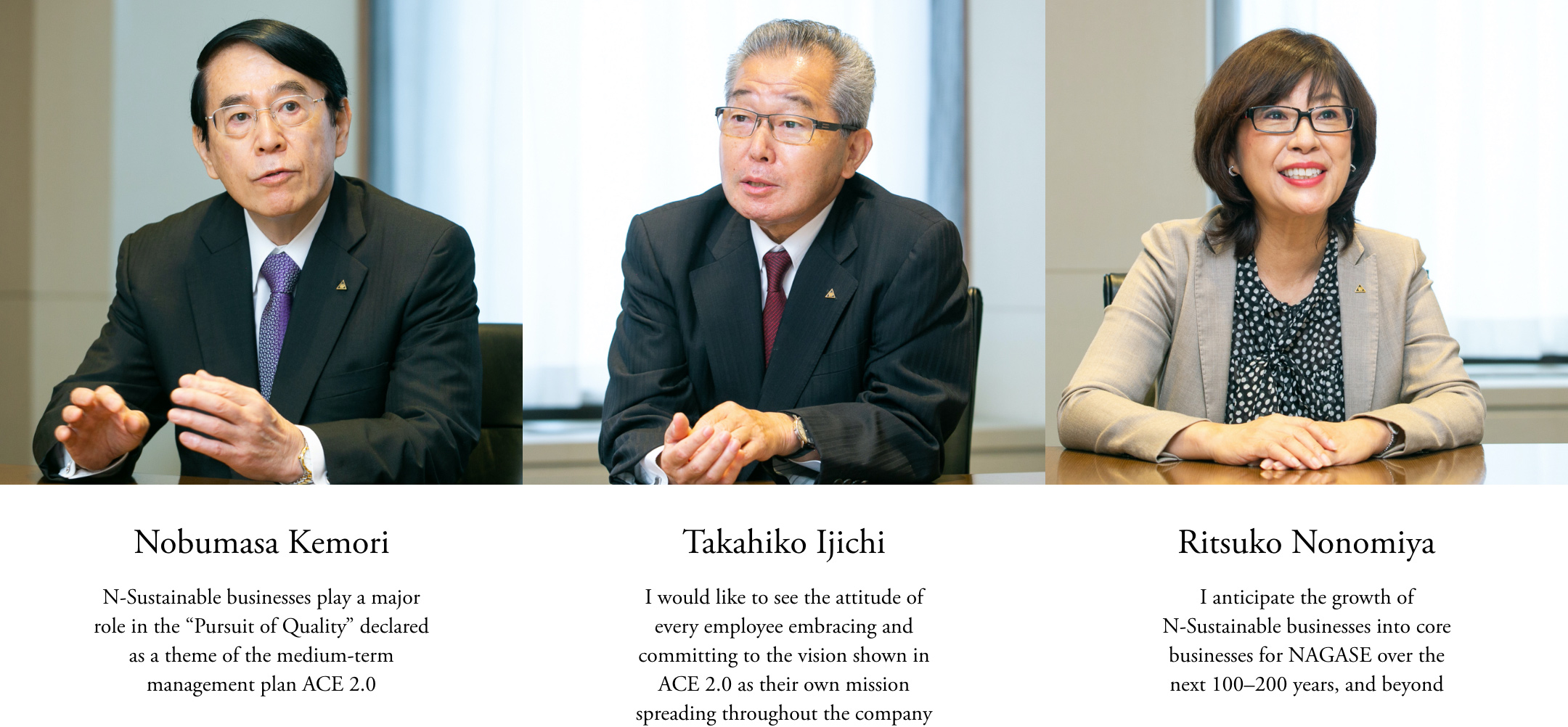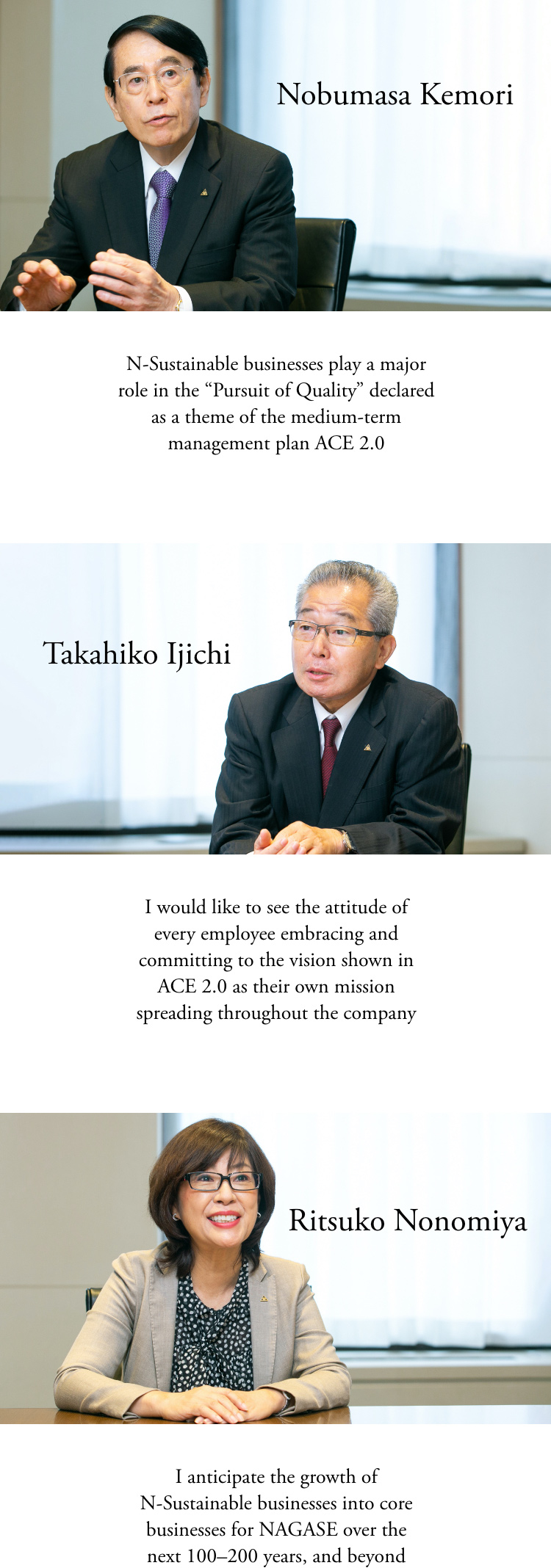Interview with the Outside Directors
A year has passed since Mr. Takahiko Ijichi and Ms. Ritsuko Nonomiya joined Mr. Nobumasa Kemori as outside directors in 2020, bringing the number of outside directors at NAGASE to three. They gathered to talk about their expectations of ACE 2.0 and sustainability for the NAGASE Group.


What initiatives of the NAGASE Group in the past year were memorable for you?
Kemori
For me, it was the Group Manufacturers’ Collaboration Committee. This committee was established to strengthen the nonfinancial foundations (including safety, hygiene, quality, and environment) of 11 NAGASE Group companies in Japan to enhance the Group’s overall corporate value and stimulate sustained growth. Although some of these 11 companies are small in scale with limited human resources, Nagase ChemteX and Hayashibara have taken leading roles in the committee to promote sharing of measures and setting/monitoring common KPIs in accordance with its policies. This has shown positive results, which is very encouraging. Challenges going forward are how to help companies that need to catch up through monitoring and how to incorporate overseas manufacturers into the committee.
Ijichi
I assumed my position quite recently, so almost everything in the past year has been memorable. What stands out the most is a debate at a Board of Directors Meeting. We were discussing withdrawal from a particular business and reviewing how we started it in the first place, when someone who had been a member of the management team at the time admitted frankly that he had made an error of judgment. I found that impressive. It isn’t easy for members of the management team to admit that they made a mistake. This honesty relates to the principle of “maintain the highest standards of integrity.” I once again sensed NAGASE’s strength, which is the source of sustainability. Although I am positive on the Company’s aggressive attitude toward starting new businesses, my impression is that we can do better in evaluating and analyzing risk. I believe the corporate culture of respecting people plays a part, but I feel there is room for improvement in appropriate evaluation and awareness of risk in making decisions about new businesses, which always have an element of risk. In my view, it is essential that the management team is aware of the risk and is committed to managing it instead of indulging in optimism that isn’t backed up by management theory.
Nonomiya
Many things have been memorable for me too, but what stands out is the tremendous progress with DX investment and initiatives. I was amazed by how employees formulated detailed action plans regarding DX, which is an abstract concept that is difficult to get your head around, and took action by hiring consulting firms, starting up internal project teams, and bringing in specialists from outside the company. The NAGASE Group is way ahead of the pack in DX initiatives and I am confident they will produce good results.
What do you think of ACE 2.0 and what are the key points for putting it into action?
Kemori
It’s crucial that we achieve targets of a plan almost 18 months in the making and the result of many discussions by the Board of Directors. To this end we must establish PDCA cycles, but I am somewhat concerned about the reduced number of KPIs that measure the outcome (including the most important reform of our profit structure) compared with ACE-2020. A smaller number of KPIs means fewer departments and subsidiaries being involved. I would like to see the corporate division closely monitoring the PCDA cycles of every department so that employees who are not directly involved in the KPIs do not lose interest and continue to participate.
Nonomiya
My impression is that employees have no resistance to change. I saw a glimpse of the NAGASE Group’s DNA and corporate culture in the absence of conservative attitudes to and rejection of change.
Ijichi
Determination to change the NAGASE Group is reflected in many aspects of ACE 2.0, which is great. How we translate this impressive management plan into day-to-day business activities will make the difference between success and failure. To this end, all NAGASE Group employees must embrace the Vision as their own challenge, adjust their course to make it happen, and run their own PDCA cycles. I have been there myself, but many companies announce idealistic visions that do not resonate with employees on the ground. To ensure this does not happen at NAGASE, I would like to see the attitude of every employee embracing and committing to the vision shown in ACE 2.0 as their own mission spread throughout the company.
Regarding the creation of sustainable businesses (N-Sustainable businesses) being sought in ACE 2.0, which parts are you looking forward to and which points do you consider to be important?
Nonomiya
To echo Mr. Ijichi, I would like every employee to consider in specific, personal terms what they need to do now and what their goals are in terms of contributing to the company. For the NAGASE Group, which has practiced sustainability for around 190 years, its positive corporate culture to change itself will be the driving force for creating sustainable businesses. I anticipate the growth of N-Sustainable businesses into core businesses for NAGASE over the next 100–200 years, and beyond.
Ijichi
N-Sustainable businesses are defined as follows: “Identify issues that customers and society have not yet recognized and provide “solutions to generate profits” [through innovative services and technologies].” This sounds like a big ask, but essentially it means tackling the simple problem of identifying customers’ urgent needs and taking a dedicated and humble attitude toward fulfilling them. What’s important in this process is to ensure that the company as a whole does not become a bureaucracy, which requires constant effort to ensure the impetus for corporate cultural reform is kept alive, including communication between departments.
Kemori
N-Sustainable businesses play a major role in the “Pursuit of Quality” declared as a theme of ACE 2.0. The challenge of harnessing digital technologies to transform traditional business models, organizations, and thinking to create new value added is typical NAGASE Group-style DX. We must analyze information and diversify ways to deliver solutions to replace traditional trading company business methods. N-Sustainable businesses require close-knit sales, manufacturing, and research teams to “foresee the issues that customers and society will face in the future.” At least two of the three teams must train capable people into a group able to identify customers’ problems and discover solutions to these problems. As the next step, we must explore how we engage with the solutions we have proposed and grow this into a business. I have expectations of N-Sustainable businesses, including their feasibility.
Profile
Nobumasa Kemori, Outside Director
Nobumasa Kemori was a director of Sumitomo Metal Mining Co., Ltd. for many years and possesses advanced knowledge of corporate management. He has been an outside director of NAGASE since 2016.
Takahiko Ijichi, Outside Director
After a long career in accounting, finance, and human resources with Toyota Motor Corporation, Takahiko Ijichi became an outside director of NAGASE in 2020.
Ritsuko Nonomiya, Outside Director
An M&A advisory specialist whose career has mainly been in the U.S., Ritsuko Nonomiya became an outside director of NAGASE in 2020.
Integrated Report 2021
Download All Pages
Download Separate Files
Story for Value Proposition of the NAGASE Group(2.2MB)
Overview of Our Value Creation Story | Our Social Significance | History of Value Creation | Our Business Model | Important Management Resources | Our Risks and Opportunities | [Feature] New Business Looking to the Future | Our Sustainability Management
CEO Message | CFO Message | Business Model Evolution Looking to the Future | Shaping Value 1: Reform of Profit Structure | Shaping Value 2: Reform of Corporate Culture | Shaping Value 3: Corporate Functions Supporting Reform
List of Businesses | Functional Materials Segment | Advanced Materials & Processing Segment | Electronics & Energy Segment | Mobility Segment | Life & Healthcare Segment | Regional Strategy
Sustainability Management(1.8MB)
Our Board | Corporate Governance | Interview with the Outside Directors | Compliance | Risk Management & Responsible Publicity and Marketing | Human Resource Development to Drive Innovation | Creating Environmental Value | Human Rights and Labor Management, Vibrant Work Environments & Responsible Supply Chain | Social Contribution Activities
11-Year Financial Highlights | Financial Information | Consolidated Subsidiaries, Affiliates and Offices | Investor Information | Corporate Information



